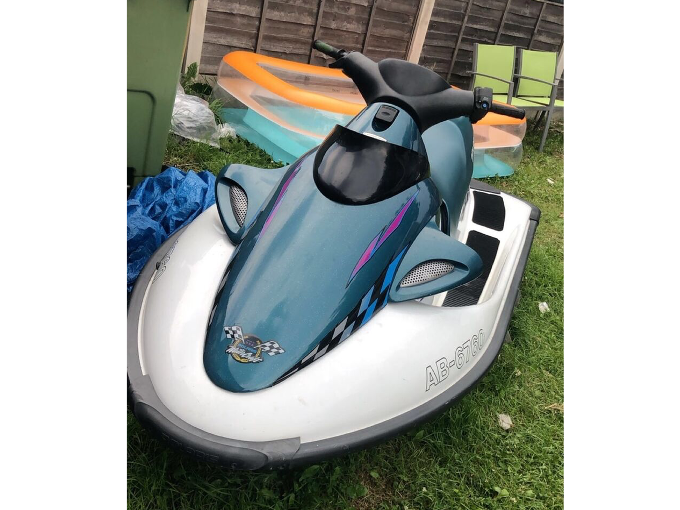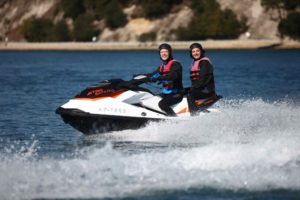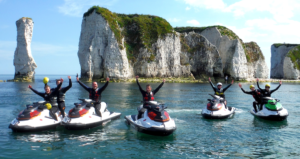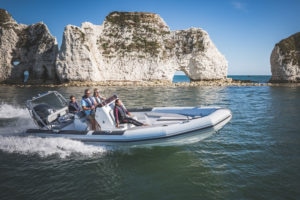HM Coastguard calls for jet skiers to respect other water users

HM Coastguard is warning people of the dangers of jet skis, personal watercraft (PWC) and motorised recreational craft after a spate of incidents in recent weeks around the south west coast.
Many of the incidents were breakdowns, but these incidents also included jet skis and motor boats overturning in the water, getting too close to other vessels, collisions and conflict between users of these craft, and other sea users, such as swimmers.
“The majority of PWC and motor craft users operate their vessels responsibly but there are some who don’t respect the water, the capabilities of their vessels and other water users,” says Richy Williams, Senior Coastal Operations Officer.
Commentators on the Maritime and Coastguard Agency’s Facebook page agree, with a list of bad behaviour complaints including some jet skiers being ‘dangerous and irresponsible’. They often speed into Hele Bay, says one commentator, “close to swimmers, paddle boarders and kayakers. An accident waiting to happen – they would not see someone snorkelling and dipping below the surface for example. They then ‘show-off’ doing 360s and racing each other in and out of the cove. 2, 3 or 4 at a time usually, ruining the beach for everyone else.”
Another commentator says: “A couple of weeks ago, I witnessed idiots getting way too close to a massive container ship, they were in so much danger the boat went out from Calshot, we heard the tannoy on shore, but they carried on until diverted from destruction.”
Not respecting other water users is a common complaint made about some jet skiers who flout the rules – whether with speed or straying out of designated areas.
“This is a long standing issue with ports and harbours,” says Martin Willis, Executive Officer, UK Harbour Masters’ Association. “Enforcement has proven to be difficult. Less responsible individuals can get hold of jet skis cheaply and often show little respect for other harbour users.”
And with thousands of search results on eBay for jet skis, it’s clear they’re easy to get hold of; older models go for as little as a couple of hundred pounds.
“Top-end jet skis are quite responsive, but basic kneel-ons are hard to control. People buy them cheaply, it’s an ongoing problem,” says Willis.
It’s the ‘have a go heroes’ who cause the bad reputation which then tars all jet ski users. Another Facebook commentator says “as a boat and jet ski user for over 30 years I have to say the majority of jet ski riders are sensible and respectful but the minority spoil it for the rest who enjoy the sport – I believe everyone should be licensed and trained to stop the f***nuggets that spoil it for the decent people.”
Licensing and training are called for by many MCA commentators who also suggest collection of new models only after training’s received, mandatory wearing of lifejackets and better checking of insurance, and datatags on access slipways. But, as Willis says, it’s very easy to launch a jet ski off a small trailer.
Instead, the UKHMA has previously made moves to legislate around the sport.
“We’ve tried to get PWC classed under the definition of a vessel, but this has not happened as of yet. A lot of maritime legislation doesn’t apply as PWC are not designated as a vessel,” Willis explains. “We need the right bylaws and legislation in port authorities to be able to regulate and, where necessary, enforce safe operation.”
The Maritime and Coastguard Agency agrees. “As jet skis and personal watercraft are not deemed to be a vessel at sea, they fall outside of our licencing powers and abilities to detain or prosecute,” a statement says.
The MCA also says local authorities have the powers to enact local bylaws which they can use to enforce the separation of beach activities to ensure the safety of all beach users. But neither the MCA nor the Coastguard has any powers with regards to the segregation of activities on the beach or near foreshore, as these rest with the local authority or beach owner if the beach is privately owned.
In the event that bylaws are breached, the local authority and the police have the powers to prosecute offenders and or move people on, so any such activity should be immediately be reported to the police.
In the short term, taking on the inconsiderate few is a problem the UKHMA is aiming to tackle by working on education measures and encouraging best practice, sharing information on harbour websites and safe operating notices at launch sites. Plus, “we’re providing dedicated launch and retrieval areas where space is available,” Willis says.
Proficiency training is also available – with many wishing it was mandatory.

Pic: Jetski Safaris
Ross Ceaton, owner of Jetski Safaris, runs a training centre in Poole Harbour. He sees a couple of thousand people a year through his doors, whether on an instructor led safari, or taking the RYA PWC course (similar to Powerboat Level 2).
“PWCs have moved on in the last ten years to sizeable craft that can travel long distances,” he says. “They’re used for fishing, exploring and towing wakeboards. So we’re seeing more port authorities requiring training. For example, Poole Harbour requires anyone under the age of 16 to have undertaken an RYA training course to operate a PWC and that they’re covered by appropriate insurance.
“The small minority gives a bad name across the board which is unfortunate,” Ceaton says. “Jet skis have a bad rep, but it’s getting better.” As he points out, it’s not just jet skiers who break the rules.
“We’re in and out the harbour every day and we see larger motorboats over the speed limit being antisocial regularly. But it goes under the radar,” he says.
And as Willis says “harbour and police patrols cost a lot of money” so they’re not as visible as some water users might wish.
Like other groups who suffer from a bad reputation (think teenagers), the blame lies with the minority rather than the majority.
That said, recently the access slipway at Lee on the Solent (Daedalus) was shut during Covid-19. According to one local resident it was because of ‘all the jet skiers’ being irresponsible and flouting lockdown rules. Homes England (the government department responsible for the supply of public land and speeding up the rate that it can be built on – and closing the slipway in question) has been asked to comment.
“I appreciate that there are t*ts out there and whilst I agree, I feel the need the wave the flag for the safety conscious considerate riders out there,” says another Facebook commentator. There “is a growing group which have completed the RYA PWC course, have insurance, carry safety equipment and pay their harbour-launching fees like any other water user.”
“Since the introduction of the RYA Personal Watercraft Proficiency certificate in the 1990s, the course has been helping candidates to understand the environment in which they are riding and to ride safely being conscious of other water users,” says Rachel Andrews, RYA Chief Instructor of the Personal Watercraft Training scheme.
“Many launch sites around the UK require riders to hold the certificate, both on inland lakes and coastal locations.

Pic: Jetski Safaris
“You can take the RYA Personal Watercraft Proficiency course in almost any area of the UK and on gaining the certificate, riders can apply for an International Certificate of Competence to be able to ride a PWC in some other countries.”
“We support all PWC users who adhere to the local and national rules of the water and will always do our best to assist local authorities, councils, Harbourmasters and others in the creation of a Beach Management Programme that meets their local requirements,” says David Pougher, Director, Personal Watercraft Partnership (PWP). The PWP has been in existence since the late 1990s and includes partners such as the RYA, British Marine, RJP Insurance, Datatag, Yamaha (WaveRunners), and Bombardier Recreational Products (Seadoo).
“In turn, therefore, if an individual or small group is not respecting the rules then the necessary action must be taken to penalise and protect the water for other PWC users. We have assisted authorities, on a small number of occasions, in successfully bringing irresponsible actions to the notice of the courts.
“However,” Pougher continues, “our primary concern is to support the massive majority who do ride responsibly. To this end, we have helped in the creation of many clubs throughout the UK where peer pressure as well as ‘club camaraderie’ has been instrumental in maintaining a balance of fun and responsible riding.”
But with the colourful collective language used on Facebook to express the ‘few’ and the lists of their exploits, it seems that camaraderie and education still have a long way to go. There is hope though.
“All new personal watercraft sold in the UK come with a voucher towards an RYA Personal Watercraft Proficiency course,” says Andrews, encouraging responsible ownership of the newer models at least.
Plus, HM Coastguard is careful not to simply point the finger at jet ski owners.
“Jet skis, PWCs and motor vessels can be powerful machines, so always operate your vessel within the limits of your, and your vessel’s, capabilities,” says Williams, widening the pool of culprits. “Be aware of the presence of other water users and ensure that you are aware of the impact your activities have on others.
“Ensure you have a means of alerting the coastguard if you get into difficulties such as a VHF, handheld VHF or mobile phone in a dry bag. A Personal Locator Beacon (PLB) may be useful for more remote locations, along with flares and, where possible, always wear a kill cord which will cut your vessel’s engine should you move away from its controls or become detached from your vessel.
“Know the bylaws that are in place in the location you are operating your vessel, stick to them and be respectful of other water users. If you see anyone putting others at risk or in difficulty at the coast, call 999 and ask for the Coastguard.”













No one want to stop people having fun on PWCs (Jet Skis) on the water particularly the Solent, most Jet Skis are licensed, data tagged, carry 3rd party insurance, do follow the rules and are careful in respect of other water users, particularly swimmers. However, they seems to have been an increase in unlicensed, uninsured, untrained jet skiers appearing, who are irresponsible and behave very dangerously on the water completely ignoring the safety of other water users. I believe we need to be able to regulate and where necessary, enforce safe operation of Jet Skis on the water.
The majority of jet skiers do not use them responsibly.they are noisy and unpleasant, motorbikes of the sea, and should never have been marketed to begin with.i believe that Norway and Switzerland (no sea but lakes!) have banned them and so should England.the sea was one of the few places to escape noise but not anymore.